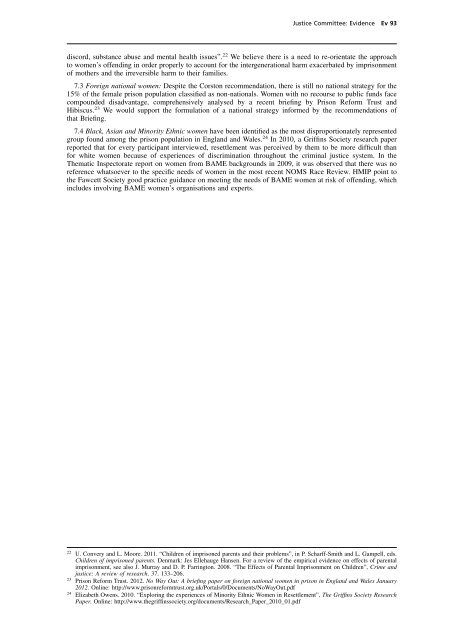Women offenders: after the Corston Report - United Kingdom ...
Women offenders: after the Corston Report - United Kingdom ...
Women offenders: after the Corston Report - United Kingdom ...
Create successful ePaper yourself
Turn your PDF publications into a flip-book with our unique Google optimized e-Paper software.
Justice Committee: Evidence Ev 93discord, substance abuse and mental health issues”. 22 We believe <strong>the</strong>re is a need to re-orientate <strong>the</strong> approachto women’s offending in order properly to account for <strong>the</strong> intergenerational harm exacerbated by imprisonmentof mo<strong>the</strong>rs and <strong>the</strong> irreversible harm to <strong>the</strong>ir families.7.3 Foreign national women: Despite <strong>the</strong> <strong>Corston</strong> recommendation, <strong>the</strong>re is still no national strategy for <strong>the</strong>15% of <strong>the</strong> female prison population classified as non-nationals. <strong>Women</strong> with no recourse to public funds facecompounded disadvantage, comprehensively analysed by a recent briefing by Prison Reform Trust andHibiscus. 23 We would support <strong>the</strong> formulation of a national strategy informed by <strong>the</strong> recommendations ofthat Briefing.7.4 Black, Asian and Minority Ethnic women have been identified as <strong>the</strong> most disproportionately representedgroup found among <strong>the</strong> prison population in England and Wales. 24 In 2010, a Griffins Society research paperreported that for every participant interviewed, resettlement was perceived by <strong>the</strong>m to be more difficult thanfor white women because of experiences of discrimination throughout <strong>the</strong> criminal justice system. In <strong>the</strong>Thematic Inspectorate report on women from BAME backgrounds in 2009, it was observed that <strong>the</strong>re was noreference whatsoever to <strong>the</strong> specific needs of women in <strong>the</strong> most recent NOMS Race Review. HMIP point to<strong>the</strong> Fawcett Society good practice guidance on meeting <strong>the</strong> needs of BAME women at risk of offending, whichincludes involving BAME women’s organisations and experts.22U. Convery and L. Moore. 2011. “Children of imprisoned parents and <strong>the</strong>ir problems”, in P. Scharff-Smith and L. Gampell, eds.Children of imprisoned parents. Denmark: Jes Ellehauge Hansen. For a review of <strong>the</strong> empirical evidence on effects of parentalimprisonment, see also J. Murray and D. P. Farrington. 2008. “The Effects of Parental Imprisonment on Children”, Crime andjustice: A review of research. 37. 133–206.23 Prison Reform Trust. 2012. No Way Out: A briefing paper on foreign national women in prison in England and Wales January2012. Online: http://www.prisonreformtrust.org.uk/Portals/0/Documents/NoWayOut.pdf24 Elizabeth Owens. 2010. “Exploring <strong>the</strong> experiences of Minority Ethnic <strong>Women</strong> in Resettlement”, The Griffins Society ResearchPaper. Online: http://www.<strong>the</strong>griffinssociety.org/documents/Research_Paper_2010_01.pdf
















